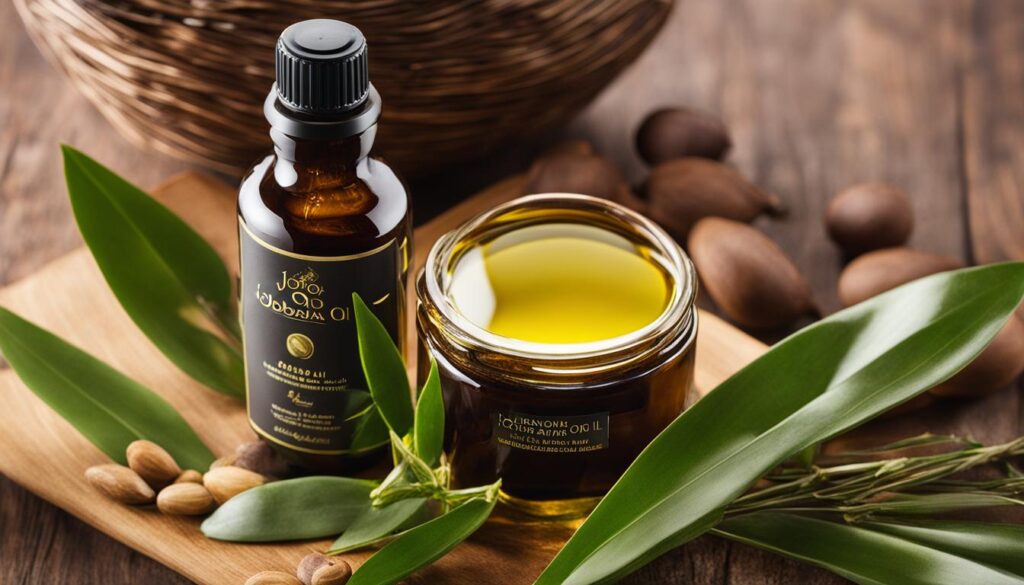Jojoba oil is a versatile and highly beneficial ingredient for both skin and hair care. Derived from the nut of the jojoba plant, this natural oil is packed with vitamins, minerals, antioxidants, and essential fatty acids, making it a powerhouse for moisturizing and nourishing the skin and hair.
When it comes to skin care, jojoba oil has numerous benefits. It can moisturize the skin, fight acne, improve fine lines and wrinkles, soothe sunburns, and even help with dry skin conditions. Its lightweight and non-greasy texture make it suitable for all skin types, including oily and sensitive skin. Jojoba oil is also a popular choice for hair care. It strengthens and conditions the hair, promotes hair growth, and improves scalp health.
Whether you’re looking to enhance your skin’s natural glow or revitalize your hair, jojoba oil is a natural wonder that can deliver impressive results. In this article, I will explore the various benefits and uses of jojoba oil, as well as tips on incorporating it into your beauty routine.
Key Takeaways:
- Jojoba oil is derived from the nut of the jojoba plant and is rich in vitamins, minerals, antioxidants, and essential fatty acids.
- It has numerous benefits for the skin, including moisturizing, fighting acne, reducing fine lines and wrinkles, soothing sunburns, and nourishing dry skin.
- For hair care, jojoba oil strengthens and conditions the hair, promotes hair growth, and improves scalp health.
- Jojoba oil is suitable for all skin types and can be easily incorporated into your beauty routine for natural and effective results.
- When using jojoba oil, it is important to do a patch test and always choose pure and organic jojoba oil for the best results.
What is Jojoba Oil?
Jojoba oil, derived from the nut of the jojoba plant, is a unique and versatile ingredient that offers numerous benefits for the skin and hair. It is derived from an evergreen plant called the jojoba plant and contains long-chain fatty acids that are similar to the fatty acids naturally found in the skin’s normal sebum. These fatty acids work together to hold on to water in the skin, preventing water loss and maintaining its hydration levels.
The composition of jojoba oil sets it apart from other plant oils, making it highly effective in moisturizing the skin. Its ability to mimic the skin’s natural sebum production helps balance oil production, making it suitable for all skin types, including oily and acne-prone skin.
The moisturizing properties of jojoba oil are attributed to its fatty acid content, including oleic acid, palmitic acid, and eicosenoic acid. These fatty acids create a barrier on the skin, locking in moisture and preventing water loss, which can lead to dryness and dehydration.
Additionally, jojoba oil is rich in vitamins, minerals, and antioxidants, further enhancing its nourishing and protective properties. It contains vitamin E, a potent antioxidant that helps protect the skin from free radicals and signs of aging. The vitamin B complex found in jojoba oil promotes healthy skin cell regeneration, maintaining a youthful and vibrant complexion.
In summary, jojoba oil is a natural and effective ingredient for skincare and haircare. Its unique composition, derived from the jojoba plant, mimics the skin’s natural sebum, making it an excellent moisturizer and barrier against water loss. With its rich fatty acid content and nourishing properties, jojoba oil provides hydration, protection, and anti-aging benefits for both the skin and hair.
Skin Benefits of Jojoba Oil

Jojoba oil is a natural wonder when it comes to skincare. Its rich composition of vitamins, minerals, and antioxidants makes it highly nourishing for the skin.
Anti-Inflammatory and Healing Properties
One of the key benefits of jojoba oil is its anti-inflammatory properties, which soothe and calm the skin. It helps to reduce redness, swelling, and irritation, making it suitable for acne-prone skin.
“Jojoba oil has been a game-changer for my acne-prone skin. Its anti-inflammatory properties have significantly reduced my breakouts and calmed down my skin.” – Jessica, skincare enthusiast
In addition to its anti-inflammatory effects, jojoba oil is also known for its healing abilities. It can accelerate the skin’s natural healing process, making it effective in the treatment of various skin conditions, scars, and even sunburns.
Moisturizing and Nourishing
Jojoba oil acts as an excellent moisturizer for the skin. Its molecular structure is similar to the natural oils produced by the skin, allowing it to deeply penetrate and lock in moisture.
Furthermore, jojoba oil is packed with vitamins E and B complex, copper, and zinc. These nutrients nourish the skin, promoting a healthy, radiant complexion.
Improves the Appearance of Fine Lines, Wrinkles, and Scars
With its potent antioxidants and rejuvenating properties, jojoba oil can help reduce the appearance of fine lines, wrinkles, and scars. It promotes collagen production, improving skin elasticity and providing a smoother, more youthful complexion.
Key Skin Benefits of Jojoba Oil
| Benefit | Description |
|---|---|
| Moisturizing | Deeply hydrates and locks in moisture for a supple complexion |
| Anti-Inflammatory | Reduces redness, swelling, and irritation, especially in acne-prone skin |
| Healing | Accelerates the skin’s natural healing process for faster recovery from various skin conditions and scars |
| Anti-Aging | Improves the appearance of fine lines, wrinkles, and scars, promoting a more youthful complexion |
In summary, jojoba oil provides a range of skin benefits, from moisturization and nourishment to anti-inflammatory and anti-aging effects. Its natural composition and versatility make it a valuable addition to any skincare routine.
Hair Benefits of Jojoba Oil

When it comes to hair care, jojoba oil is a natural gem that offers numerous benefits. This versatile ingredient is not only known for its moisturizing properties but also its ability to nourish and revitalize the hair, promoting overall hair health.
One of the key advantages of jojoba oil is its moisturizing effect on dry and brittle hair. The oil deeply penetrates the hair shaft, providing intense hydration and restoring moisture balance. It helps combat dryness, leaving your hair feeling soft, smooth, and more manageable.
Another remarkable benefit of jojoba oil is its ability to prevent split ends. By coating the hair follicles with a protective layer, jojoba oil helps to seal moisture and prevent breakage, reducing the appearance of split ends. This not only promotes healthier-looking hair but also helps to maintain your hair’s length and overall appearance.
The vitamins found in jojoba oil, such as vitamin E, along with essential minerals like copper and zinc, play a crucial role in promoting hair growth and maintaining scalp health. These nutrients help to strengthen the hair follicles, stimulating hair growth and preventing hair loss. Additionally, a healthy scalp is essential for optimal hair growth, and jojoba oil helps to nourish the scalp, keeping it moisturized and free from dryness or flakiness.
Regular use of jojoba oil can result in thicker, fuller-looking hair with enhanced shine. Its nourishing properties help to rejuvenate dull and lifeless hair, giving it a healthy and vibrant appearance.
How to Use Jojoba Oil for Hair:
- As a deep conditioner: Apply jojoba oil to clean, damp hair and leave it on for at least 30 minutes before rinsing it off with shampoo.
- As a leave-in conditioner: After washing and towel-drying your hair, apply a few drops of jojoba oil to the ends of your hair to add moisture and prevent frizz.
- As a scalp treatment: Massage a few drops of jojoba oil into your scalp to stimulate blood circulation and nourish the hair follicles. Leave it on overnight or for a few hours before washing it out.
By incorporating jojoba oil into your hair care routine, you can experience its incredible benefits and achieve healthier, more vibrant hair. The natural nourishing properties of jojoba oil make it a valuable addition to your hair care arsenal.
Using Jojoba Oil for Skin and Hair

Jojoba oil is a versatile ingredient that can be incorporated into both your skincare and hair care routines. Whether you want to moisturize your skin or nourish your hair, jojoba oil has got you covered. Here are some tips on how to use jojoba oil effectively:
Skincare Routine
In your skincare routine, jojoba oil can be applied directly to the skin without dilution. To maximize its benefits, it is recommended to use jojoba oil as the last step, after applying toners and serums. This allows the oil to lock in moisture and provide a protective barrier for your skin. The hydrating properties of jojoba oil make it particularly beneficial for those with dry skin.
When using jojoba oil for your face, simply take a few drops of the oil, warm it up between your palms, and gently massage it onto your skin. Focus on areas that require extra hydration, such as the cheeks or forehead. Jojoba oil can also be used as a natural makeup remover, effectively dissolving even stubborn waterproof makeup. Apply a small amount to a cotton pad and gently wipe away the makeup.
Tip: Jojoba oil has a luxurious texture that resembles wax. To optimize absorption and avoid any greasiness, it is best to use it at night as part of your skincare routine.
Hair Care Routine
To incorporate jojoba oil into your hair care routine, focus on applying it to the roots and working it through the lengths and ends of your hair. Avoid applying it directly to your scalp, as the thick texture of jojoba oil may weigh down your hair or leave it looking greasy.
For an overnight hair treatment, warm up a small amount of jojoba oil between your palms and apply it to your hair, concentrating on the ends. Massage it in to ensure even distribution, then secure your hair in a loose bun or braid. Leave it on overnight and rinse it out in the morning for soft, nourished strands.
Alternatively, you can add a few drops of jojoba oil to your regular conditioner to enhance its moisturizing properties. This will leave your hair feeling hydrated, smooth, and radiant.
| Benefit | How to Use |
|---|---|
| Deep Conditioning Treatment | Apply jojoba oil to damp hair, focusing on the ends. Leave it on for 30 minutes to an hour, then rinse thoroughly. |
| Frizz Control | Smooth a small amount of jojoba oil over dry, frizzy hair to tame flyaways and add shine. |
| Scalp Massage | Warm up jojoba oil and gently massage it into your scalp to promote circulation and nourish the hair follicles. |
Jojoba oil’s unique composition and texture make it an ideal addition to your skincare and hair care routines. With its moisturizing and nourishing properties, it can help you achieve healthier, more radiant skin and hair.
Jojoba Oil for Sensitive Skin

Jojoba oil is a versatile and gentle ingredient that can be safely used on sensitive skin, even for individuals with conditions like eczema and psoriasis. Its soothing properties and nourishing benefits make it an excellent choice for those with delicate skin types.
Before incorporating jojoba oil into your skincare routine, it is advisable to conduct a patch-test. This simple precaution helps determine if you have any allergies or sensitivities to the oil. Apply a small amount of jojoba oil to a small area of skin, such as the inner arm, and observe for any adverse reactions such as redness, itching, or irritation. If no negative reactions occur within 24 hours, you can confidently proceed with using jojoba oil on a larger area of your skin.
One of the key advantages of jojoba oil is that it does not clog pores, making it suitable for sensitive skin. It is a non-comedogenic ingredient that helps balance oil production without causing breakouts. This makes jojoba oil an excellent moisturizer for individuals with sensitive or acne-prone skin, as it provides hydration without exacerbating existing issues.
Moreover, the natural composition of jojoba oil closely mimics the skin’s own sebum. This similarity allows it to be easily absorbed by the skin, providing deep hydration and nourishment. It can help soothe and calm inflamed skin, reducing redness and irritation associated with sensitive skin conditions like eczema and psoriasis.
When using jojoba oil on sensitive skin, it is recommended to apply it in moderation and in conjunction with your regular skincare routine. Incorporate it into your moisturizer, serum, or face masks for added hydration. Additionally, jojoba oil can also be used for scalp massages or as a conditioning treatment for dry and sensitive hair.
Overall, jojoba oil proves to be an excellent choice for individuals with sensitive skin. Its gentle nature, moisturizing properties, and compatibility with various skin types make it a versatile and valuable addition to your skincare regimen. By incorporating jojoba oil into your routine, you can enjoy the benefits of nourished and balanced skin without worrying about sensitivities or allergic reactions.
Possible Side Effects of Jojoba Oil

While jojoba oil is generally considered safe for use on the skin, it is important to be aware of possible side effects. Although reports of allergies are uncommon, it is always recommended to perform a patch test before using jojoba oil on a larger area of the skin.
If you are allergic to jojoba oil, you may experience allergic reactions such as hives and itching. These symptoms can vary in severity and may require medical attention if they persist or worsen.
It is also worth noting that individuals with known allergies to certain plants, nuts, or other botanical substances may potentially have a higher risk of developing an allergic reaction to jojoba oil. If you have a history of allergies, it is advisable to consult with a healthcare professional before incorporating jojoba oil into your skincare routine.
Despite these possible side effects, it is important to emphasize that jojoba oil is generally considered safe for use on the skin and is well-tolerated by most individuals.
Expert Insight:
“Although allergic reactions to jojoba oil are rare, it is always recommended to perform a patch test prior to using any new skincare product. This simple step can help identify any potential sensitivities and prevent unnecessary skin irritation.” – Dr. Sarah Thompson, Dermatologist
Jojoba Oil as an Anti-Aging Ingredient

Jojoba oil is highly regarded for its anti-aging properties, making it a popular choice in skincare routines. One of the key components that contribute to its effectiveness is vitamin E, which plays a crucial role in reducing the appearance of age spots, fine lines, and wrinkles.
Vitamin E is a powerful antioxidant that helps protect the skin from free radicals, which can cause premature aging. By neutralizing these harmful molecules, vitamin E helps maintain the integrity of the skin and promotes a youthful appearance.
Furthermore, jojoba oil improves skin elasticity, which is essential for maintaining a youthful and healthy complexion. As we age, our skin naturally loses elasticity, leading to sagging and the formation of wrinkles. By moisturizing and nourishing the skin, jojoba oil helps restore and improve its elasticity, resulting in a firmer and more toned appearance.
Many companies have recognized the numerous benefits of jojoba oil in combating the signs of aging. As a result, it is a common ingredient found in anti-aging skincare products, such as creams, serums, and lotions. These products often combine jojoba oil with other moisturizing and collagen-boosting ingredients to provide a comprehensive solution for achieving a youthful and radiant complexion.
Overall, incorporating jojoba oil into your skincare routine can help promote a more youthful and healthier appearance. Its ability to reduce the visibility of age spots, fine lines, and wrinkles, along with its skin-firming properties, makes it a valuable asset in the fight against aging.
| Benefits of Jojoba Oil for Anti-Aging |
|---|
| Reduces the appearance of age spots |
| Diminishes fine lines and wrinkles |
| Improves skin elasticity |
| Promotes a more youthful and healthier complexion |
Incorporating Jojoba Oil into Your Beauty Routine

Jojoba oil is a versatile ingredient that can be seamlessly integrated into both your skincare and hair care routines. Whether you prefer using dedicated jojoba oil products or incorporating this nourishing oil into your existing beauty products, the benefits are worth exploring. Here are some ways to incorporate jojoba oil into your beauty routine:
1. Skincare Products
Many skincare products already contain jojoba oil as an active ingredient. Look for moisturizers, serums, and facial oils that feature jojoba oil to reap its moisturizing and nourishing benefits. Due to its ability to mimic the skin’s sebum, jojoba oil can help balance oil production, making it suitable for both dry and oily skin types. Additionally, it has anti-inflammatory properties that can soothe irritated skin and promote a healthy complexion.
2. Hair Products
Jojoba oil can work wonders for your hair when incorporated into your hair care routine. Look for shampoos, conditioners, and hair masks that contain jojoba oil to add moisture, shine, and softness to your locks. Its lightweight texture ensures that it won’t weigh your hair down, making it suitable for all hair types. Massaging jojoba oil into your scalp can also nourish the hair follicles, promoting healthy hair growth.
3. Natural Lip Balm
Jojoba oil can be used as a natural alternative to lip balm, providing deep hydration and protection for your lips. Its emollient properties help to moisturize and soften dry, chapped lips, leaving them smooth and supple. You can either apply pure jojoba oil directly to your lips or combine it with other natural ingredients such as beeswax or shea butter to create a homemade lip balm.
4. Makeup Remover
If you’re looking for a gentle and effective makeup remover, jojoba oil is an excellent option. Its ability to dissolve makeup, including waterproof formulas, makes it an ideal choice for effortlessly removing all traces of makeup at the end of the day. Simply apply a small amount of jojoba oil to a cotton pad and gently wipe away your makeup, leaving your skin clean and refreshed.
5. Cuticle Oil
Jojoba oil can also be used as a cuticle oil to maintain the health and appearance of your nails and cuticles. Its moisturizing properties help to soften and hydrate the cuticles, preventing dryness and promoting healthy nail growth. To use jojoba oil as a cuticle treatment, simply massage a few drops of oil onto your nails and cuticles daily.
Incorporating jojoba oil into your beauty routine can bring about numerous benefits for your skin, hair, and overall well-being. Experiment with different products and DIY formulations to find the best way to harness the power of jojoba oil for your unique beauty needs.
Conclusion
Jojoba oil is a natural wonder when it comes to skincare and hair care. With its nourishing properties and rich composition of vitamins, minerals, and antioxidants, it has become an essential ingredient in many natural beauty products. Whether you are looking to moisturize your skin or strengthen your hair, jojoba oil offers holistic and effective solutions.
For skincare, jojoba oil provides deep hydration, fights acne, reduces the appearance of fine lines and wrinkles, and soothes sunburns. Its ability to mimic the skin’s natural sebum makes it a perfect choice for all skin types. Jojoba oil is packed with vitamins and minerals that nourish and protect the skin, promoting a healthy and radiant complexion.
When it comes to hair care, jojoba oil works wonders. It moisturizes and conditions the hair, preventing split ends and adding shine and softness. The vitamins and minerals present in jojoba oil promote hair growth and improve scalp health, making it an excellent choice for those dealing with dry and damaged hair.
With its versatile nature, jojoba oil can be easily incorporated into your beauty routine. Whether you use it on its own or as an ingredient in skincare and hair care products, jojoba oil offers natural and nourishing benefits. Embrace the power of jojoba oil and experience the wonders it can bring to your skin and hair.
FAQ
What are the benefits of jojoba oil for the skin?
Jojoba oil moisturizes the skin, fights acne, improves fine lines and wrinkles, soothes sunburns, and strengthens the hair.
What are the benefits of jojoba oil for the hair?
Jojoba oil moisturizes and nourishes the hair, preventing split ends, adding shine and softness, promoting hair growth, and improving scalp health.
How can jojoba oil be used for skin and hair care?
Jojoba oil can be applied directly to the skin or hair, used as a makeup remover or cuticle oil, added to skincare and hair care products, or used as a natural lip balm.
Is jojoba oil safe for sensitive skin?
Yes, jojoba oil is generally safe for sensitive skin, including conditions like eczema and psoriasis. However, it is recommended to do a patch test before applying it to a larger area.
What are the possible side effects of jojoba oil?
The risk of allergies is low, but allergic reactions may include hives and itching. It is essential to do a patch test before using jojoba oil on a larger area of skin.
Can jojoba oil be used as an anti-aging ingredient?
Yes, jojoba oil has anti-aging properties. It contains vitamin E, which reduces the appearance of age spots, fine lines, and wrinkles, and improves skin elasticity.
How can jojoba oil be incorporated into a beauty routine?
Jojoba oil can be found in various skincare and hair care products or used on its own as a moisturizer, makeup remover, cuticle oil, or natural substitute for lip balm.
What are the general benefits of using jojoba oil?
Jojoba oil provides nourishing properties for natural skincare and hair care, making it a valuable ingredient in personal care routines.






